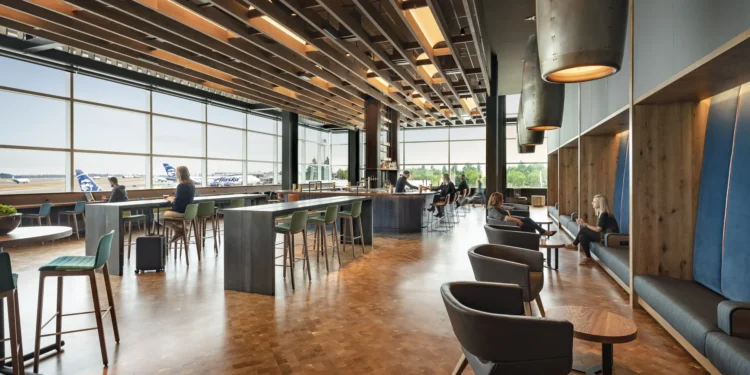Alaska Airlines will create a dedicated business class lounge at Seattle-Tacoma International Airport as part of ongoing renovations to the C Concourse, a company executive announced Thursday.
Ryan St. John, Alaska’s vice president of investor relations, revealed the airline plans to divide its new C Concourse lounge space into two separate facilities: one serving regular lounge members and another exclusively for business class passengers.
“We haven’t given a lot of details about it yet, just that we’ve started construction, and if you go to Sea-Tac, you’ll see all that work going on at the C Gates,” St. John told reporters.
The announcement reflects Alaska’s broader strategy to capture revenue from premium travelers. St. John noted that income from passengers in premium cabins “continues to outperform the main cabin” during the third quarter, particularly following the airline’s $1.9 billion acquisition of Hawaiian Airlines last year.
The move follows Delta Air Lines’ June opening of two lounges spanning 24,000 square feet in Sea-Tac’s A Concourse, including a Delta One Lounge and Delta Sky Club.
Alaska has aggressively expanded its lounge network along the West Coast over recent years. The carrier opened an 11,000-square-foot facility at San Francisco International Airport in December and announced plans in September for a 13,000-square-foot lounge at San Diego International Airport.
Construction continues on Alaska’s 20,000-square-foot C Concourse lounge, part of a $399 million expansion adding four stories and more than 145,000 square feet to the terminal. Airport officials expect completion next spring before the FIFA World Cup.
“(The C Concourse is) a whole big project, and ours will be on top of that,” St. John explained. “It’ll kind of be like the North satellite lounge, where it’s above the main terminal and they’ll have a nice, beautiful view onto the airfield.”
Alaska Airlines representatives did not provide additional information about amenities, access requirements, or specific features planned for the business class lounge.
The renovated C Concourse will include numerous dining options announced last fall, featuring Chili’s, Buffalo Wild Wings Go, Great State Burger, and Seattle-based Lady Yum macarons.
The business class lounge separation creates tiered exclusivity within Alaska’s premium offerings, distinguishing top-tier passengers who purchase expensive front-cabin tickets from credit card holders and frequent fliers who access standard lounges through membership programs.
Ryan St. John’s public discussion of lounge investments during investor relations activities signals Alaska’s effort to communicate premium strategy to financial analysts who increasingly view business class amenities as profit drivers outweighing traditional metrics like load factors.
The premium cabin revenue outperformance validates airline industry trends where carriers derive disproportionate margins from business class passengers paying three to ten times economy fares while consuming only twice the physical space per seat.
The Hawaiian Airlines integration following last year’s $1.9 billion purchase expands Alaska’s premium passenger base beyond mainland business travelers to include transpacific leisure customers willing to pay premiums for lie-flat seats on six-hour flights to Honolulu and Maui.
Delta’s dual-lounge A Concourse opening established competitive benchmark forcing Alaska to match premium amenities or risk losing corporate travel contracts where lounge quality influences airline selection by business travel managers negotiating company-wide agreements.
The West Coast lounge expansion encompassing San Francisco, San Diego, and Seattle positions Alaska to compete with United Airlines for technology industry corporate accounts headquartered throughout California, Oregon, and Washington whose employees generate substantial premium revenue.
The 20,000-square-foot C Concourse facility doubles San Francisco’s footprint, reflecting Sea-Tac’s status as Alaska’s primary hub operating over 300 daily departures requiring extensive lounge capacity to accommodate premium passengers across morning, midday, and evening banking waves.
The $399 million Port of Seattle investment adding 145,000 square feet across four C Concourse levels represents infrastructure modernization supporting Sea-Tac’s position among America’s ten busiest airports serving Seattle’s technology-driven economic growth.
The spring 2026 completion targeting FIFA World Cup arrival demonstrates Port of Seattle urgency to showcase modernized facilities to international visitors attending soccer matches in Seattle, Vancouver, and other North American cities hosting tournament games.
The North Satellite lounge comparison promising “nice, beautiful view onto the airfield” suggests Alaska will replicate aviation enthusiast appeal where plane spotters watch departures and arrivals from elevated vantage points while enjoying premium food and beverages.
The Chili’s, Buffalo Wild Wings Go, Great State Burger, and Lady Yum restaurant mix balances national chain familiarity for travelers from other cities with Seattle-based Lady Yum providing local authenticity through premium French macarons featuring Pacific Northwest ingredients.
The Alaska spokesperson’s non-response regarding business class lounge details indicates either incomplete planning where amenities remain undecided or strategic information control where the carrier delays announcements until formal marketing campaigns launch closer to opening.
The visible C Gates construction mentioned by St. John manages passenger expectations during disruptive renovation work while building anticipation for improved facilities that justify temporary inconveniences like gate changes and reduced seating areas.
Sea-Tac’s C Concourse primarily serves Alaska flights to California, Hawaii, Mexico, and select East Coast destinations, concentrating the carrier’s highest-yield routes where business class load factors justify dedicated lounge investment beyond shared facilities.
The business class lounge positioning atop the concourse creates literal elevation where premium passengers physically ascend above general gate areas, reinforcing status differentiation through architectural hierarchy separating elite travelers from economy passengers.
Washington state’s concentration of Fortune 500 companies including Amazon, Microsoft, Costco, and Starbucks generates substantial corporate travel demand where executives and senior managers expect premium airport amenities matching their professional status and company travel policies.
The lounge split strategy allows Alaska to maintain broad lounge access through credit card partnerships generating fee income while creating ultra-premium spaces reserved for passengers actually purchasing business class tickets rather than accessing lounges through alternative credentials.







